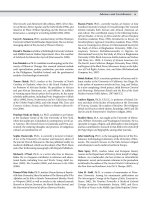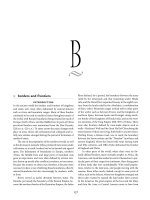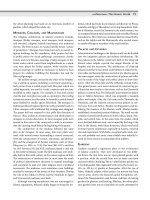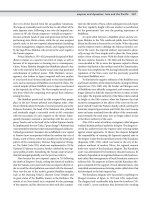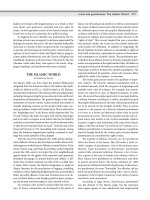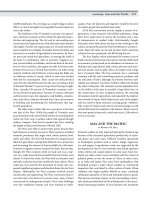Encyclopedia of society and culture in the medieval world (4 volume set) ( facts on file library of world history ) ( PDFDrive ) 58
Bạn đang xem bản rút gọn của tài liệu. Xem và tải ngay bản đầy đủ của tài liệu tại đây (83.2 KB, 1 trang )
agriculture: Europe 31
resulted from the invasions and migrations from the north
and east, which had broken up large estates, permanently
scattered the landowning Roman aristocracy, and had ended
the system of rural slavery. The staple crops in the region were
wheat, olives, and wine grapes, with the addition of beans
that added protein to a peasant’s meager diet. Stock farming
of cattle, pigs, sheep, and goats was important in the interior
of the Balkan Peninsula and Asia Minor. Byzantine farmers
used a variety of iron tools and broke the land with a small
plow known as the ard. Through the first centuries of the empire, as the rural population expanded, new land was cleared
for planting in the forests of the Balkans, and irrigation works
brought water to dry regions of Asia Minor and the Levant.
Village Life
and
Work
Medieval peasants lived within small villages, which in
northern Europe were surrounded by unfenced land divided
into narrow strips. This open-field system of scattered strips
of land separated by furrows or boundary fences dates to the
time of Charlemagne. Strip farming made plowing with a
large team of animals easier, because fewer turns were necessary to work a single parcel of land. The heavy moldboard
plow used in northern Europe dug deep furrows, allowing excess rainfall to drain more easily. By the 10th century wheeled
plows were coming into use in northern Europe. These heavy
instruments were pulled by teams of oxen, in teams of two or
four. (Heavier, rocky soil required even larger teams.)
Horses had been less common than oxen because they
were more expensive to buy and feed. But the use of horses as
farm animals increased with the arrival of the horse collar,
which was invented in China and came to Europe around the
eighth or ninth century with the caravans of traders crossing
from eastern Asia along the Silk Road. The padded collar fit
around the animal’s neck but did not cut off its breathing, as
did earlier harnesses. By distributing the weight of the load,
the horse collar enabled the horse to plow heavy soil and haul
heavy carts at a faster pace than could an ox.
Each farmer worked several narrow 1-acre plots within
a larger field. Farmers owned plows and heavy equipment
in common and shared the labor of plowing, planting, and
harvesting their crops. The plots that were the property of a
single peasant were an endless subject of dispute over rights
and inheritance within the household. As families multiplied, the plots were parceled out among the heirs, leading to
a patchwork quilt of tenancy rights that did little to enhance
the efficiency of food production.
Every year the farmer paid out a portion of his harvest to
the lord as a form of rent. The peasants also relied on a house
garden to provide them with cabbages, leeks, onions, and
garlic as well as dye plants, medicinal herbs, and cash crops
Man with pruning hook climbing palm tree; detail of a manuscript
page, Spain, 1220 (Courtesy the Morgan Library and Museum)
such as flax and hemp. Pastures were owned communally,
with stock animals looked after by the village herdsman. Also
held in common were forested areas, useful for cutting wood,
hunting small game, and collecting wild food such as nuts,
berries, and mushrooms. The forest floors also were used for
pannage, or pasturing for domesticated pigs, which fed on
ground nuts and fallen acorns.
The homes of the peasants were constructed of wattle
and daub, or mud plastered over a frame of sawn wood or
heavy branches.. Tightly bound straw or reeds were used as
roofing material. For the peasants living in these small and
dark homes, disease and hunger were familiar, travel was
dangerous, and life was full of perils. Their diet consisted of
bread and ale, vegetables from their private gardens, and occasional meat: beef, pork, chicken, or other fowl such as geese
and wild game or birds.

